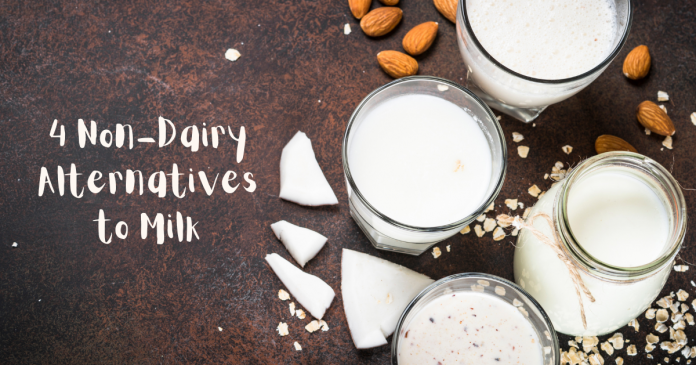It is becoming more and more common to give up dairy products. This happened for many reasons, ranging from milk allergies and lactose intolerance to ethical concerns. How can we find (non-dairy) alternatives?
WHAT IS IN COW’S MILK?
Milk is a complex food and in 100 g of cow’s milk contain:
- 87 g water
- 3 g protein
- 4 g fat (approx. 50% of which is made up of saturated fatty acids like palmitic acid, about 25% is unsaturated fatty acids like oleic acid, and the rest is polyunsaturated fatty acids like linoleic acid)
- 5 g carbohydrate (primarily lactose)
- Vitamins like A, B1, B2, B3, B5, B6; biotin, folic acid, B12, C, D, E, and K.
- Minerals like sodium, potassium, calcium, magnesium, phosphorus, sulfur, and chloride.
- Trace elements like iron, copper, zinc, manganese, fluoride, and iodine.
DAIRY ALLERGIES AND SENSITIVITIES: WHAT CAUSES THEM?
An allergy to milk or dairy products is different from being lactose intolerant. If someone is intolerant, the problems are caused by lactose. An allergy, on the other hand, is a reaction to certain proteins in the milk. Allergens in milk include casein, beta-lactoglobulin, and alpha-lactalbumin. The body reacts by fighting harmless proteins, which then creates allergic reactions.
PLANT-BASED MILK SUBSTITUTES: WHAT INGREDIENTS SHOULD I AVOID?
When consumed in moderation, plant-based milk alternatives can be just as nutritious as conventional cow’s milk. You should stay away from alternatives that contain hidden ingredients that can harm your health. These include:
- Sugar: Sugar is disguised by many names (e.g. sucrose, dextrose, glucose, fructose, fructose syrup, glucose syrup, maltodextrin, lactose, maltose, etc.) Sugar addiction is a real issue, which is why added sugar should be avoided in every way. You should completely stay away from artificial sweeteners.
- Natural flavors: These include flavor constituents derived from plant or animal products. However, they no longer have anything in common with the food they come from, aside from the same chemical components.
- Stabilizers like gellan gum: Gellan gum is a polysaccharide produced by the bacterium Sphingomonas elodea. It has the E-number 418 and is frequently combined with the thickening agent xanthan gum, which can have a laxative effect when consumed in large amounts.
- Acid regulators: Acid regulators, such as phosphates, are added to milk alternatives to maintain the pH during storage. However, here is a lot of controversy surrounding the use of high concentrations of phosphates as a food additive, which is why they should only be consumed in small amounts.
Be sure to read the ingredient list before you buy any alternative milk.
WHAT ARE THE BEST (PLANT-BASED) ALTERNATIVES TO DAIRY MILK?
1. COCONUT MILK
The coconut milk you can purchase at your supermarket is a good dairy-free alternative. It is made by blending coconut meat and provides nutrients such as magnesium, iron, and potassium. Lauric acid, a medium-chain fatty acid found in coconut milk, is easily absorbed by the body and used as energy.
Full-fat coconut milk is high in calories. Despite its health benefits, it is best to consume smaller portions. If you are buying coconut milk, look for pure, organic coconut milk that is commonly sold in cans.
2. ALMOND MILK
Almond milk is a mixture of finely ground almonds and water. It is a particularly good alternative to cow’s milk for people who are allergic to dairy products. It is almost free of allergens and contains neither lactose, soy proteins, nor gluten. Almond milk has anti-inflammatory properties and may be easier to digest than dairy milk. Almond milk has the downside of being sweetened with added sugar and fortified with additional nutrients. It’s best to buy plain, organic almond milk, or even better, to make your own. Step-by-step instructions are available online.
3. OAT MILK
A good alternative to milk is oat milk since it does not contain lactose or milk protein. Fiber-rich cereal grains fill you up relatively quickly since they’re high in fiber.
4. SOY MILK
For people with lactose, milk protein, or gluten intolerance, soy milk is a popular vegan milk alternative. It is also a good source of protein and essential fatty acids. Despite this, soy milk is often criticized. It contains isoflavones, which have a chemical structure similar to that of the hormone estrogen, which our body produces. Soy milk can influence estrogen levels in our bodies in both a positive and a negative way. Take this milk alternative in moderation, and never give soy products to infants or toddlers.


